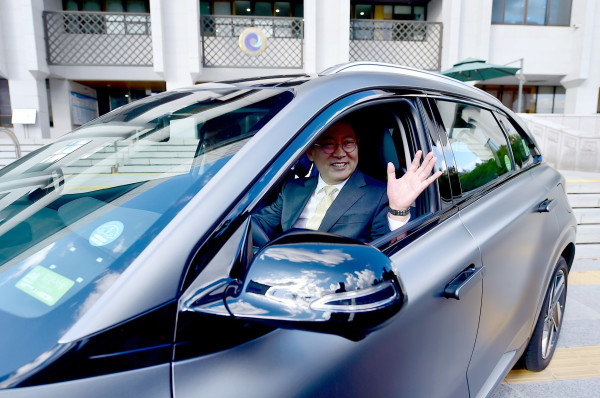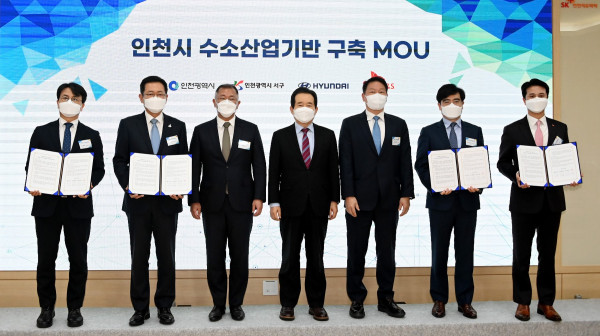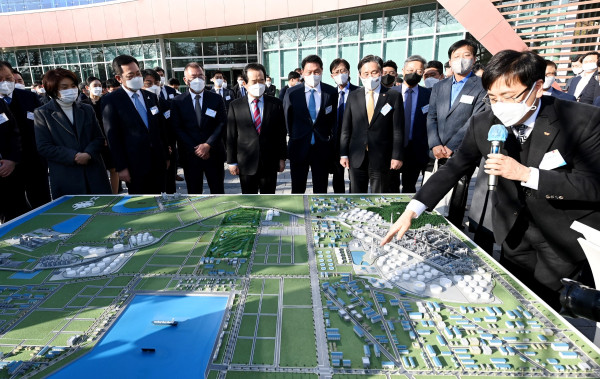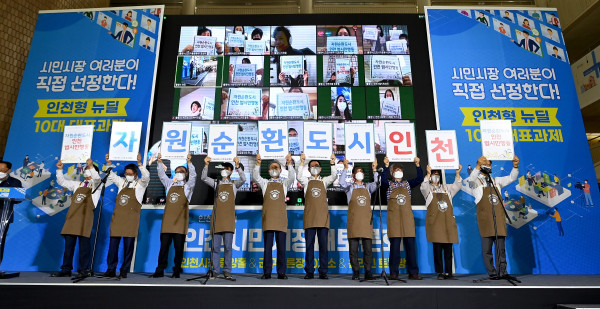Joins the Powering Past Coal Alliance, explores the expansion of hydrogen-powered mobility solutions and the reduction of greenhouse gases
Incheon recently rolled up its sleeves to take a more aggressive stance in building an economy based on hydrogen, which is widely regarded as an eco-friendly future energy source. It is accelerating its plans to make the city carbon neutral with more green buildings and clean factories, and by creating urban forests capable of absorbing carbon.

▲ Incheon is taking a more aggressive stance in building an economy based on hydrogen, which is widely regarded as an eco-friendly future energy source. Incheon Mayor Park Namchoon on October 18, 2018, testing Hyundai’s hydrogen electric vehicle “Nexo.”
Incheon declares itself a leader in the hydrogen industry, accelerates transition to eco-friendly energy
To transition from a fossil fuel-driven society to an eco-friendly energy-driven society at a faster pace, Incheon joined hands with the corporate sector and declared itself a “leading hydrogen city.”
On March 2, the Incheon Metropolitan Government, Seo-gu Office, Hyundai Motor Company, and SK E&S signed an “MOU on mutual cooperation for the establishment of the hydrogen industry.” The Hydrogen Economy Committee(chaired by Prime Minister Chung Sye-kyun), the Korean government’s control tower for hydrogen economy initiatives, joined the agreement as well.
Under its newest MOU, Incheon will take the lead in building abio/by-product hydrogen production cluster, and explore ways to offer financial and administrative support for initiatives such as transitioning to a hydrogen vehicles system and building the required infrastructure. Meanwhile, Seo-gu will look to build a hydrogen industry base, improve the environment, and bolster safety.
In order to contribute to the expansion of the hydrogen economy, Hyundai Motor Company plans to promote the hydrogen car industry, supply hydrogen-powered cars, and actively participate in Incheon’s project to establish a foundation for its bio/by-product hydrogen production cluster. SK E&S plans to participate in the construction of the bio/by-product hydrogen production cluster in Incheon, and invest in building the infrastructure facilities for liquefied hydrogen in connection with the cluster project.
Moving forward, Incheon will do its best to build a bio/by-product hydrogen production cluster that utilizes bio-hydrogen from landfills in the metropolitan area, along with by-product hydrogen, and expand the supply of hydrogen-powered mobility solutions.
With large corporations joining Incheon’s plan to build a hydrogen production cluster, the project is expected to bring significant economic benefits, such as job creation and development of related industries, to the city.
Mayor Park Namchoon said, “In order to respond to climate change and become a carbon-neutral city, the supply of hydrogen energy is a necessity, not a luxury. Using optimized production facilities for hydrogen, we will develop Incheon’s ecosystem for hydrogen production moving forward. Also, based on scientific research for hydrogen safety, we plan on building a consensus with our citizens and make the Incheon’s hydrogen production cluster a primer for Korea’s hydrogen economy.”

▲ On March 2, Incheon hosted the “3rd Hydrogen Economic Committee Meeting” and a signing ceremony for the “MOU on mutual cooperation for the establishment of the hydrogen industry” at SK Incheon Petro chemicals inSeo-gu, Incheon. From the left: Lee Jae-hyeon (District Mayor, Seo-gu Office), Park Namchoon (Mayor, Incheon Metropolitan City Government), Chung Eui-sun(President, Hyundai Motor Group), Chung Sye-kyun (Prime Minister), Chey Tae-won(President, SK Group), Gong Young-woon (President, Hyundai Motor Corporation),Choo Hyeongwook (President, SK E&S)

▲ Attendees at the MOU signing ceremony listening to an brief on the planned location of the SK Hydrogen Liquefaction Plant project.
Incheon to reduce greenhouse gas 32.6% by 2030
To reduce 32.6% of all greenhouse gases generated by buildings in its jurisdiction by 2030, Incheon plans to establish and execute its “Detailed Action Plan for Green Buildings” developed specifically to promote the construction of green buildings.
A “Green Building” refers to a structure designed to minimize greenhouse gas emissions with eco-friendly designs and construction methods by applying energy efficiency and using new and renewable energy technologies.
Green buildings are significant in creating a sustainable futureas they can prevent environmental pollution by conserving resources, improve air quality by reducing fuel consumption, and reduce the emission of greenhouse gases such as carbon dioxide.
In terms of greenhouse gas emissions by sector in Korea, as of 2017, buildings emitted 24.6% all greenhouse gases in Korea (industrial emissions were 55.3%), making them a serious source of total greenhouse gases. As for Incheon, out of its total greenhouse gas emissions of 740 million TCO2eq, buildings accounted for 176 million TCO2eq, representing a similar figure to the national average at about 25% of all greenhouse gas emissions.
Thus, the green buildings initiative can work as a key project that accelerates Incheon’s transition to a carbon neutral city. In particular,the green buildings initiative is the most realistic plan as it is very closely related to the daily lives of people, and a core initiative of the central government’s Green New Deal that must be initiated as quickly as possible.
The “Detailed Action Plan for Green Buildings” project established by the city to promote green buildings is a five-pronged plan - a)establish an institutional basis; b) build green buildings tailored to Incheon; c) improve the green environment; d) promote a culture of green buildings; and e) promote the initiative to the public.
Incheon will establish the “Incheon Metropolitan City Green Building Design Standards” within this year, and standards such as eco-friendly and energy performance will be applied to buildings subject to architectural deliberations (e.g. new construction and renovation) to lay the institutional foundation required for the green buildings project.
Then, Incheon plans to reflect its regional characteristics to implement a zero-energy construction system that utilizes renewable energy such as recycled rainwater and hydrogen fuel cells, and establish guidelines for transforming old buildings into green buildings tailored to Incheon’s environment. Starting this year, Incheon is planning to find new projects it can realistically undertake, and to pursue those project after securing the necessary budget during the second half of the year.
Third, Incheon plans to create a green environment by remodeling public buildings mainly used by marginalized segments of its population into green buildings, by building zero-energy “My House (Incheon’s permanent rental housing program)” buildings, and by providing various incentives to improve the energy performance of buildings. In 2020, Incheon broke ground on 22 green remodeling sites, including national and public daycare centers. The goal is to complete 600 units by 2024.
Fourth, Incheon will provide energy experience-related booths at the Incheon Architecture Festival (scheduled in October), and host green building competitions to identify creative future ideas for green architecture tailored to its citizens and reflect them in policies to promote a culture of green architecture culture.
Lastly, Incheon plans to promote the popularization of green buildings and spread awareness by producing brochures on green buildings and offering various green education programs.

▲ At the “2020 Incheon Citizen’s Market Grand Debate” held at the central hall of the Metropolitan City Hall on October 13, 2020, Incheon announced its own version of the Green New Deal and helped its citizens give various presentations on the circulation of resources.
Incheon promoting its own version of a Green New Deal to take the leap as an “eco-friendly” city
Incheon is actively responding to environmental issues by promoting its “Incheon Green New Deal,” which focuses on major transformations to resource recycling policies and the reduction of carbon emissions.
Key projects include an eco-friendly landfill (Incheon Eco Land), which will get under way when the metropolitan area landfills close in 2025, an urban forest that absorbs green house gases, and the supply of eco-friendly cars.
This year, Incheon is ready to create an urban forest equivalent to the size of 13 football pitches. Incheon’s new urban forests will be built across 45 different locations and cover 105,000 m2 in the form of a forest along the 3rd Gyeongin Expressway designed to block micro dust, urban wind forests, and indoor smart gardens.
Also, by 2022, Incheon will boost its supply of eco-friendly vehicles, including 22,000 electric vehicles and 2500 hydrogen fuel cell vehicles. Overall, the Incheon Green New Deal will welcome approximately 60,000 eco-friendly cars (50,000 electric cars and 10,000 hydrogen-powered cars) and 3,000 green buildings to its jurisdiction.
The number of “Clean Factories” (factories in industrial complexes converted into eco-friendly factories using cutting-edge green technology) will also go from 15 in 2020 to 90 in 2025.
Regarding the new eco-friendly landfill site, Mayor Park Namchoon announced Yeongheungdo Island in Ongjin-gun as the final candidate for Incheon Eco Land. He said, “We plan to make Yeongheungdo a central part of our eco-friendly city and an engine that drives Korea into an eco-friendly future.”
Incheon Eco Land will be built and operated using eco-friendly techniques rather than the current direct landfill methods, which means it will do no environmental damage to the surrounding area. According to estimates, that only about eight 20-ton trucks will be required per day by landfilling only the residues and other non-combustible remnants left behind after recycling the incinerated ash from the resource recycling center.
Meanwhile, Incheon joined the Powering Past Coal Alliance (PPCA) in November last year in line with the push by governments and the international community to actively respond to the climate crisis and transition to sustainable, eco-friendly energy systems.